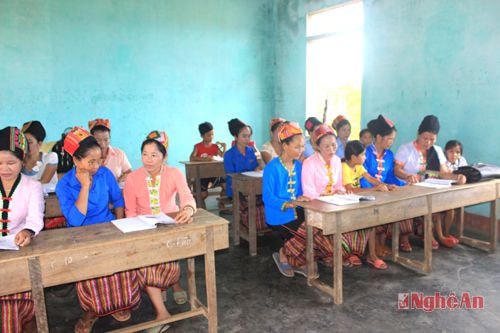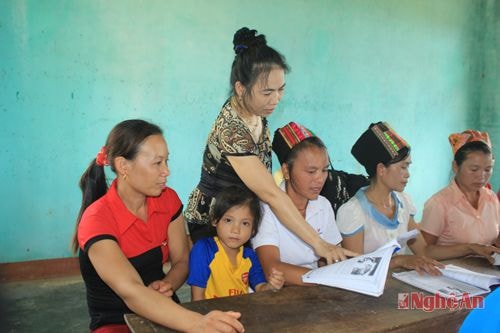Literacy classes in the highlands
(Baonghean) - In June, when students start their summer vacation, literacy classes are at their peak, starting to increase their hours and sessions. From these classes, every year thousands of people become literate, making an important contribution to improving the intellectual level of the people...
This year, teacher Hoang Thi Loan turned 51. Although she belongs to the "old generation", she is still very happy when the principal of Binh Son Primary School (Anh Son) assigned her to teach a literacy class for the people of Giap Gat village. Since receiving this decision, she has also spent more time reading documents on literacy because she understands that her students are not six or seven year old students but older people, even grandparents. She has to learn Thai and Thanh languages of the local people to make her classes more effective. Although it is hard, after more than twenty-five years standing on the podium, these are the most memorable days of her experience. And for the first time, she feels the meaning of literacy work, feels the joy of the people when they know how to read and write...
 |
| Literacy class in Giap Gat village, Binh Son commune, Anh Son district. |
Giap Gat village is located in the most remote area of Binh Son commune, bordering Tho Son commune on one side and Tan Ky district on the other. The distance from Cay Chanh intersection to the commune is not far, only about 20 km, but we still had to struggle to get to the center because Highway 7B is under construction, many places are still unfinished. Teacher Nguyen Dinh Dong, Principal of Binh Son Primary School, shared: The life of people in Binh Son commune has been less difficult and miserable for the past few years, after the bridge was built across the Con River. In the past, partly because of the difficult roads, partly because the roads were difficult, having to cross rivers and streams, people in hamlets in remote areas could not go to school. Coming to Giap Gat, we can understand more clearly the difficulties and hardships of the people here. Not only the Thai and Thanh people, but also many people from Hung Nguyen and Nam Dan who came here to do new economic activities since the late 60s, there are also dozens of people who are uneducated and illiterate. Ms. Ho Thi Sinh (47 years old) is one of them. She said that when she came here to do business, because she was poor, she only knew how to work hard, she was not even full, let alone learn to read and write. Due to such hardship, in her family, not only her husband and wife but also her two children (one born in 1993, the other in 1994) were illiterate. Ms. Lo Thi Niem, 66 years old, an elderly member of the class, shared: Not knowing how to read and write is very hard, very disadvantaged. Joining the class, knowing how to read and write, opens up many things. The simplest thing is going to the hospital to read the instructions and know the way to go... Since opening the literacy class in Giap Gat village, every 2-3 days, Vice Chairman of the commune, Ho Van Than, has come to the class to encourage the members to try to learn to read and write. The commune has also allocated funds to buy books, notebooks, and pens to support the women. Talking about the significance of literacy work, Vice Chairman of Binh Son commune said: Binh Son is focusing on developing the hill garden economy. Although there are many programs to support science and technology in production for people, because the rate of illiterate people is still high, the effectiveness of the programs is not high. Moreover, if people are illiterate, when they go to the commune to sign documents, they only know how to point, which is very troublesome. It is also difficult to borrow capital from the bank to do business...
Eradicating illiteracy is one of the solutions to improve people's knowledge and help people acquire knowledge and professional skills. Although this is extremely necessary, up to now, the work of eradicating illiteracy in our province still faces many difficulties, especially in propaganda work. For example, in Con Cuong district, who has been following the field of eradicating illiteracy for many years, Ms. Dang Thi Mai - a specialist of the Department of Education confided: To teach people to read and write, teachers are never afraid of difficulties or hardships. They are only worried about not being able to motivate people to study. Perhaps that is why the Department of Education of Con Cuong district has been successful in opening 2-3 literacy classes every year. Moreover, as long as there are classes, whether students request morning, noon or evening, teachers are ready to teach, not afraid of hardship. The day we went to Luc Da, we saw that the literacy class of Moi village started at 12 noon. On days when people are busy going to the fields or picking bamboo shoots in the forest, it is moved to the evening. Talking to reporters, teacher Le Thi Nam, Luc Da 2 Primary School, said: The students in the literacy class are too old, so it is very difficult for them to form letters. In order for students to absorb the lessons quickly, teachers must combine new technology programs, regularly organize games, and ask questions related to reality... Besides, the movement is mainly limited to female students. As for male students, most of them are not enthusiastic about going to class because of their inferiority complex. Fortunately, although their awareness is limited, when they go to school, they study very enthusiastically and try to complete the entire literacy program.
 |
According to statistics from the Department of Education and Training, currently in our province, there are still about 4% of ethnic minorities aged 15 - 60 who are illiterate. Meanwhile, this group is partly due to customs and practices, partly due to being scattered, not having the need to learn and update knowledge after learning to read and write, so they face many difficulties in mobilizing, maintaining and organizing classes. To overcome this situation, every year the Department of Education and Training has guided and directed units to investigate and count the number of illiterate and re-illiterate people in their age group. On that basis, plans are developed and targets are assigned to open literacy classes and continuing education after learning to read and write to reduce the number of illiterate and re-illiterate people in their age group, and to improve the standards of universal primary education in literacy in the area, especially in mountainous communes, highlands, and ethnic minority areas. On the local side, the steering committees at all levels have promoted the role of social organizations such as the Fatherland Front, Youth Union, Women's Union, Farmers' Union, Veterans' Union, Education Promotion Association, Border Guards, Village Elders, and Village Chiefs to mobilize school-age children to go to school and maintain the number of students in general education classes. In addition, the associations have also integrated investment programs and projects to support disadvantaged groups, helping students to eliminate hunger and reduce poverty and improve their quality of life. In addition, through many forms of propaganda on mass media about the importance of literacy for the development of individuals, families, and communities; linking anti-illiteracy propaganda with the building of a learning society and local emulation movements. In addition, the province also pays attention to creating conditions to support books, pens and ink for students; has policies to support mobilizers and teachers in class. Thanks to that, in 2015 alone, the whole province opened 106 literacy classes for more than 2,300 students in the districts of Tuong Duong, Ky Son, Con Cuong, Anh Son, Tan Ky, Quy Chau. In addition, many advanced classes for students have continued to be opened to help students improve their qualifications. Evaluating the current literacy work, Mr. Nguyen Huy Cao - Deputy Head of the Department of Continuing Education, Department of Education and Training shared that: Literacy classes have great humanistic significance, the letters have helped women to be more confident in life, actively participate in social activities and help localities to be more convenient in propaganda work about the policies and guidelines of the Party and the State...
My Ha

.png)






